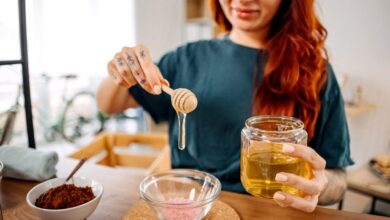5 gut-healthy habits this top nutrition expert swears by


Gut health—how well your digestive system is functioning to break down food, absorb nutrients, and eliminate waste—is trendy. But it’s grounded in science as research has shown that keeping your gut in good health is linked not only to an improved immune system but to better mental health. That’s because within your gut lies the gut microbiome, made up of trillions of microorganisms including bacteria, viruses, and fungi—and having a balanced microbiome can help regulate blood sugar, support digestion, and strengthen the immune system.
While people post frequently on social media about the importance of gut health and hacks to reduce bloating and “heal your gut,” what will actually support your digestive health is not always clear. It’s why we turned to nutrition expert and King’s College London professor of epidemiology Tim Spector, who has spent a substantial part of his research on the gut microbiome.
To know whether your own gut is healthy, he tells Fortune, Spector suggests getting a gut microbiome test from your health care provider, which will measure the ratio of good bacteria to bad bacteria. Not having regular bowel movements or experiencing frequent bloating and heartburn after eating can also be indicators of an unhealthy gut (the American Gastroenterological Association says that going three times per week to three times per day is normal). People with chronic diseases like obesity and diabetes are also more likely to have issues with their gut health, Spector adds.
What you eat is likely the best reflection of what’s going on in your gut. “Take an honest look at your diet,” he says. If you’re eating mostly meat and highly processed foods, those microbiomes are likely unhealthy—even if you don’t have any symptoms.
“Not everyone has symptoms. Not everyone knows that they have problems,” he says.
Here, he shares the five simple habits that he sticks to regularly to keep his gut healthy.
He eats 30 different plants per week
Yes, 30 is a lot! But Spector is a big proponent of consuming a diverse diet of plants, which he says is key to a healthy gut microbiome. That’s because eating a variety of plants will not only feed your gut microbiome the high fiber content its bacteria needs to flourish, but it will also provide a range of fiber sources that keep the gut well-fed, Spector says.
For guidance on how to even find that many plant foods, turn to dietitian Megan Rossi, who promoted the idea of 30 plants per week in her book How to Eat More Plants and Love Your Gut. She recommended choosing from what she calls the super six: whole grains (like quinoa, rolled oats, and whole-grain bread), nuts and seeds, vegetables, fruits, beans and legumes, and herbs and spices (like cumin, cinnamon, and turmeric).
He also eats “the rainbow“
Within that diversity of plants, Spector tries to get a medley of hues on his plate. Foods that span the color spectrum like blueberries, cherries, leafy greens, cocoa, and herbs, says Spector, are rich in polyphenols—plant compounds which are anti-inflammatory and shown to boost gut health as microbes love to feed off of them.
He consumes at least three servings of fermented foods per day
During the fermentation process, foods like sauerkraut, kimchi, yogurt, and kefir grow bacteria that are good for our gut—which is why Spector eats them on a daily basis.
“I think we’ve underestimated [fermented foods] and overestimated the effect of commercial probiotics,” he tells Fortune.
Spector tries to incorporate fermented foods naturally into his meals. That could look like tossing kimchi into a salad, putting sauerkraut on a sandwich, replacing crème frâiche with kefir or yogurt, or snacking on pickles and cheese, he says.
“You don’t have to get lots of [fermented foods] into you. But small amounts regularly have an effect on your immune system,” Spector says.
He’s stopped eating at night
Every night, Spector makes sure to give his gut a break. That means no nighttime eating or snacking, which allows microbes to “clean up” the gut to help maintain a strong gut lining—the inner surface of the intestines which acts as a barrier, allowing nutrients and water into the bloodstream while blocking toxins and bacteria from moving between the bloodstream and gastrointestinal system.
Spector says your gut has a “day team” and a “night team” of microbes, which are essentially aligned with our circadian rhythms (our natura internal clock). “The day microbes rest when the food stops, and then the nighttime team comes out,” he explains. “You’ve got this nighttime cleaning team that comes out. If you disrupt that, if you keep eating through the night, then those guys just don’t get the chance to clean up your gut.”
That “cleaning” he’s referring to is of the “debris” that other microbes haven’t eaten during the day, Spector says. If you keep eating, the daytime microbes will keep working, he says. “We have a circadian rhythm and the microbes have evolved along with that.”
He avoids highly processed foods
Ultra-processed foods—which are often pre-packaged, low in fiber, and high in sugar, saturated fat, and salt—are known to increase inflammation in the body. Chronic inflammation is one of the biggest risk factors for cancer, according to the National Cancer Institute—and an inflamed gut can lead to unpleasant symptoms like diarrhea, gas, bloating, and abdominal pain.
Previous studies have also shown that an ultra-processed-heavy diet not only increases risk and growth of colorectal cancer, but also plays a role in other diseases, including Alzheimer’s, diabetes and cardiovascular conditions.
Spector keeps away from the most heavily processed foods out there, like salty packaged snacks and breakfast cereals, to allow his gut-friendly diet to help reduce inflammation—but he will regularly indulge in some dark chocolate.
“Avoid the worst offenders and you can reduce inflammation,” he says.
For more on gut health:
- Vitamin D may improve gut health and help prevent chronic disease. How to make sure you’re getting enough
- This gastroenterologist says probiotics are ‘a waste of money.’ Here’s what you should be doing instead
- Coca-Cola is Olipop’s and Poppi’s latest prebiotic soda competitor. But are ‘healthy’ sodas actually good for you?
- Experts say the ‘diversity diet’ of eating 30 plants a week could boost your gut health.Here’s how to get started
This story was originally featured on Fortune.com
https://fortune.com/img-assets/wp-content/uploads/2025/04/GettyImages-1304320892-e1744825672366.jpg?resize=1200,600
2025-04-16 18:49:29





